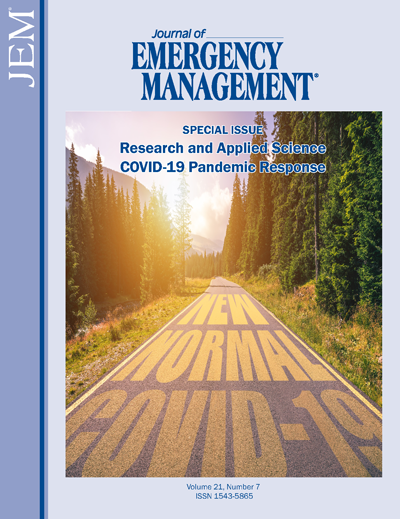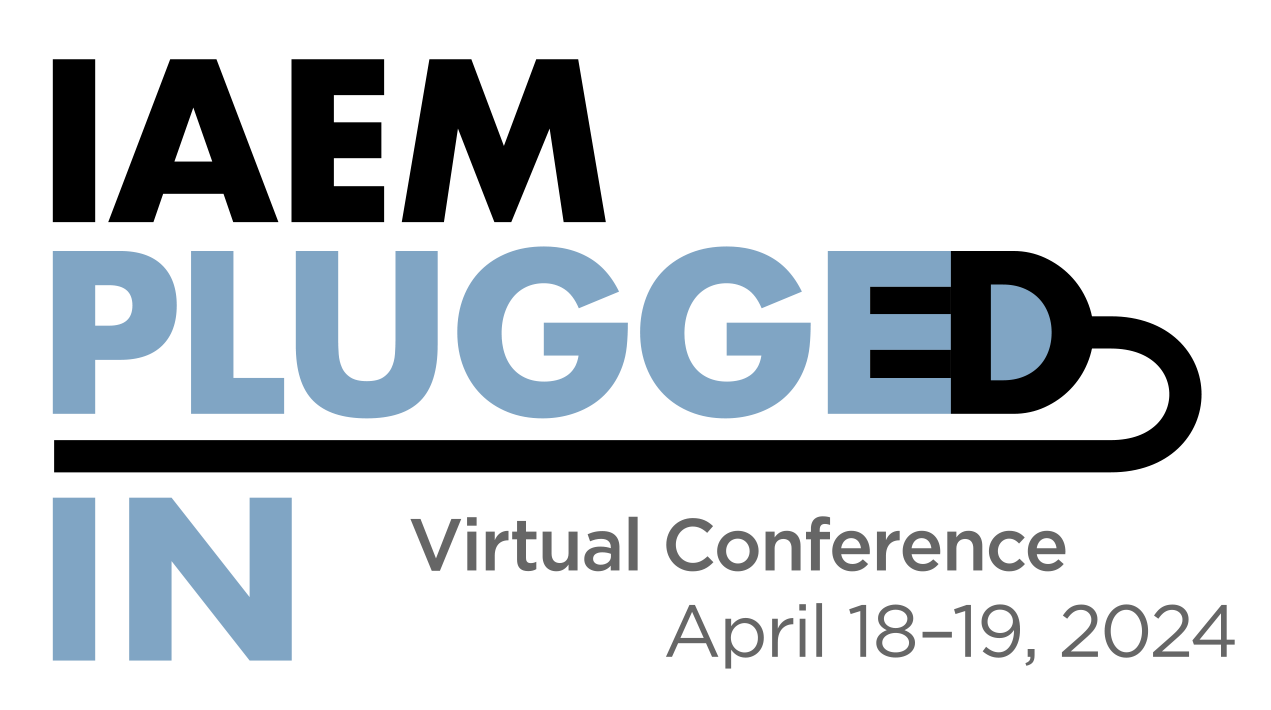Sustaining disaster aid in the onset of the COVID-19 pandemic
DOI:
https://doi.org/10.5055/jem.0701Keywords:
COVID-19, disaster aid, aid agencies, low- and middle-income countries, strategy, partner relationships, program adaptation, communication technologyAbstract
The COVID-19 pandemic had a global reach and impact, introducing stay at home orders, social distancing, facemask wearing, and closing national and international borders. Yet, the need for international disaster aid as a result of previous disasters and ongoing crises remained present. Interviews with staff from United Kingdom aid agencies and their partner organizations examined how development and humanitarian activities changed during the first six months of the pandemic. Seven key themes were highlighted. The need to recognize individual country contexts and experiences when dealing with a pandemic was emphasized, together with appropriate strategic decisions around guidance and supporting staff and the value of learning from previous experiences. Restrictions limited agencies’ ability to monitor programs and ensure accountability effectively, but relationships between partners adjusted, with a move to a greater reliance on local partners and increased empowerment in these groups. Trust was vital to allow for the continuation of programs and services during the first months of the pandemic. Most programs continued but with significant adaptations. An enhanced use of communication technology was a key adaptation, though caveats remained around access. Concern around safeguarding and stigmatization of vulnerable groups was reported as an increasing issue in some contexts. The impact of COVID-19 restrictions on ongoing disaster aid was rapid and extensive, forcing aid agencies at different scales to work swiftly to try to ensure as little disruption as possible, and generating important lessons for both the ongoing and future crises.
References
Lee K, Worsnop CZ, Grépin KA, et al.: Global coordination on cross-border travel and trade measures crucial to COVID-19 response. Lancet (London). 2020; 395(2310237): 1593-1595. DOI: 10.1016/s0140-6736(20)31032-1.
von Tigerstrom BJ, Halabi SF, Wilson KR: The international health regulations (2005) and the re-establishment of international travel amidst the COVID-19 pandemic. J Travel Med. 2021; 27(8): taaa127. DOI: 10.1093/jtm/taaa127.
ThinkGlobalHealth: UPDATED: Timeline of the coronavirus. Available at https://www.thinkglobalhealth.org/article/updatedtimeline-coronavirus. Accessed March 4, 2021.
OCHA: In the battle against COVID-19, aid groups are achieving results for vulnerable communities. Available at https://reliefweb.int/report/world/battle-against-covid-19-aid-groups-are-achievingresults-vulnerable-communities-enar. Accessed March 4, 2021.
Refugees International: COVID-19 and the displaced: Addressing the threat of the novel coronavirus in humanitarian emergencies. Available at https://www.refugeesinternational.org/reports/2020/3/29/covid-19-and-the-displaced-addressing-thethreat-of-the-novel-coronavirus-in-humanitarian-emergencies. Accessed March 4, 2021.
Nkengasong JN: COVID-19: Unprecedented but expected. Nat Med. 2021; 27(3): 364-364. DOI: 10.1038/s41591-021-01269-x.
Maat H, Balabanova D, Mokuwa E, et al.: Towards sustainable community-based systems for infectious disease and disaster response; lessons from local initiatives in four African countries. Sustain (Switzer). 2021; 13(18): 10083.
Mayhew SH, Kyamusugulwa PM, Bindu KK, et al.: Responding to the 2018–2020 Ebola virus outbreak in the democratic republic of the Congo: Rethinking humanitarian approaches. RMHP. 2021; 14: 1731-1747.
Boyd AT, Cookson ST, Anderson M, et al.: Centers for disease control and prevention public health response to humanitarian emergencies, 2007–2016. Emerg Infect Dis. 2017; 23: S196-S202.
Moll R, Reece S, Cosford P, et al.: The Ebola epidemic and public health response. Br Med Bull. 2016; 117(1): 15-23.
Global Change Data Lab: Our world in data. Available at https://ourworldindata.org/coronavirus#coronavirus-country-profiles. Accessed March 8, 2021.
Neal DM, Phillips BD: Effective emergency management: Reconsidering the bureaucratic approach. Disasters. 1995; 19(4): 327-337. DOI: 10.1111/j.1467-7717.1995.tb00353.x.
Hansel TC, Saltzman LY, Bordnick PS: Behavioral health and response for COVID-19. Disaster Med Public Health Prep. 2020; 14(5): 670-676. DOI: 10.1017/dmp.2020.180.
Morton Hamer MJ, Reed PL, Greulich JD, et al.: The West Africa disaster preparedness initiative: Strengthening national capacities for all-hazards disaster preparedness. Disaster Med Public Health Prep. 2017; 11(4): 431-438. DOI: 10.1017/dmp.2016.155.
Scott V, Crawford-Browne S, Sanders D: Critiquing the response to the Ebola epidemic through a primary health care approach. BMC Public Health. 2016; 16(1): 410. DOI: 10.1186/s12889-016-3071-4.
Wadoum REG, Clarke A: How prepared is Africa to face COVID-19? Pan Afr Med J. 2020; 35: 1-3.
Rosenthal PJ, Breman JG, Djimde AA, et al.: COVID-19: Shining the light on Africa. Am J Trop Med Hyg. 2020; 102(6): 1145-1148. DOI: 10.4269/ajtmh.20-0380.
Chi YL, Bump JB: Resource allocation processes at multilateral organizations working in global health. Health Policy Plann. 2018; 33: i4-i13.
Honig D, Gulrajani N: Making good on donors’ desire to do development differently. Third World Q. 2018; 39(1): 68-84.
McDonough A, Rodríguez DC: How donors support civil society as government accountability advocates: A review of strategies and implications for transition of donor funding in global health. Global Health. 2020; 16(1): Article 110.
Harris V, Tuladhar S: Humanitarian localisation: Can we put values into practice? Res Ethical Issues Organ. 2019; 22: 33-55.
Barakat S, Milton S: Localisation across the humanitarian-development-peace nexus. J Peacebuilding Dev. 2020; 15(2): 147-163.
Betts A, Easton-Calabria E, Pincock K: Localising public health: Refugee-led organisations as first and last responders in COVID-19. World Dev. 2021; 139: 105311.
Elston JWT, Cartwright C, Ndumbi P, et al.: The health impact of the 2014–15 Ebola outbreak. Public Health. 2017; 143: 60-70. DOI: 10.1016/j.puhe.2016.10.020.
Elston JWT, Moosa AJ, Moses F, et al.: Impact of the Ebola outbreak on health systems and population health in Sierra Leone. J Public Health. 2015; 38(4): fdv158-678. DOI: 10.1093/pubmed/fdv158.
Ly J, Sathananthan V, Griffiths T, et al.: Facility-based delivery during the Ebola virus disease epidemic in rural Liberia: Analysis from a cross-sectional, population-based household survey. PLOS Med. 2016; 13(8): e1002096. DOI: 10.1371/journal.pmed.1002096.
Doctors of the World: Beyond Ebola: Rebuilding health services in Moyamba, Sierra Leone. 2015. Available at http://b.3cdn.net/droftheworld/54befeb29ddee73fa1_s4m62058i.pdf. Accessed March 17, 2021.
Chand D, Nayak S, Bhat KS, et al.: A mobile application for women’s safety: WoSApp C3. In IEEE Region 10 Annual International Conference, Proceedings/TENCON. 2016, January.
Madianou M, Ong JC, Longboan L, et al.: The appearance of accountability: Communication technologies and power asymmetries in humanitarian aid and disaster recovery. J Commun. 2016; 66(6): 960-981.
Castillo-López G, Guaranda MB, Layedra F, et al.: A place to go: Locating damaged regions after natural disasters through mobile phone data C3. Commun Comput Inform Sci. 2020; 1070: 239-251.
Jones L, Ballon P: Tracking changes in resilience and recovery after natural hazards: Insights from a high-frequency mobilephone panel survey. Global Environ Change. 2020; 62: 102053.
Hossain S, Beresford M: Paving the pathway for women’s empowerment? A review of information and communication technology development in Bangladesh. Contemp South Asia. 2012; 20(4): 455-469. DOI: 10.1080/09584935.2012.737309.
Porter G, Hampshire K, Abane A, et al.: Mobile phones, gender, and female empowerment in Sub-Saharan Africa: Studies with African youth. Inform Technol Dev. 2020; 26(1): 180-193. DOI: 10.1080/02681102.2019.1622500.
Warner AT: What is Monitoring in Humanitarian Action? Describing Practice and Identifying Challenges. London: ALNAP, 2017.
Boehmer HM, Zaytsev YK: Raising aid efficiency with international development aid monitoring and evaluation systems. J Multidiscipl Eval. 2019; 15(32): 28-36.
Antonio A, Tuffley D: The gender digital divide in developing countries. Future Internet. 2014; 6(4): 673-687.
Kwami J: Gendered digital inequities in African contexts: Measuring and bridging the gaps. Ada. 2020; 2020: 1-15.
Roelen K, Ackley C, Boyce P, et al.: COVID-19 in LMICs: The need to place stigma front and centre to its response. Eur J Dev Res. 2020; 32(5): 1592-1612. DOI: 10.1057/s41287-020-00316-6.
Parry BR, Gordon E: The shadow pandemic: Inequitable gendered impacts of COVID-19 in South Africa. Gender Work Organ. 2021; 28(2): 795-806. DOI: 10.1111/gwao.12565.
UNFPA, UNICEF: Child marriage in COVID-19 contexts: Disruptions, alternative approaches and building programme resilience. 2020. Available at https://www.unicef.org/esa/media/7651/file/Child-Marriage-in-COVID-19-contexts.pdf. Accessed June 14, 2021.
Jones N, Gebeyehu Y, Gezahegne K, et al.: Child marriage risks in the context of COVID-19 in Ethiopia. Policy brief. 2020. Available at https://assets.publishing.service.gov.uk/media/5f314dec8fa8f57acac337db/GAGE-Covid-19-Ethiopia-child-marriage.pdf.
Morens DM, Fauci AS: Emerging pandemic diseases: How we got to COVID-19. Cell. 2020; 182(5): 1077-1092. DOI: 10.1016/j.cell.2020.08.021.
Downloads
Published
How to Cite
Issue
Section
License
Copyright 2007-2023, Weston Medical Publishing, LLC and Journal of Emergency Management. All Rights Reserved








